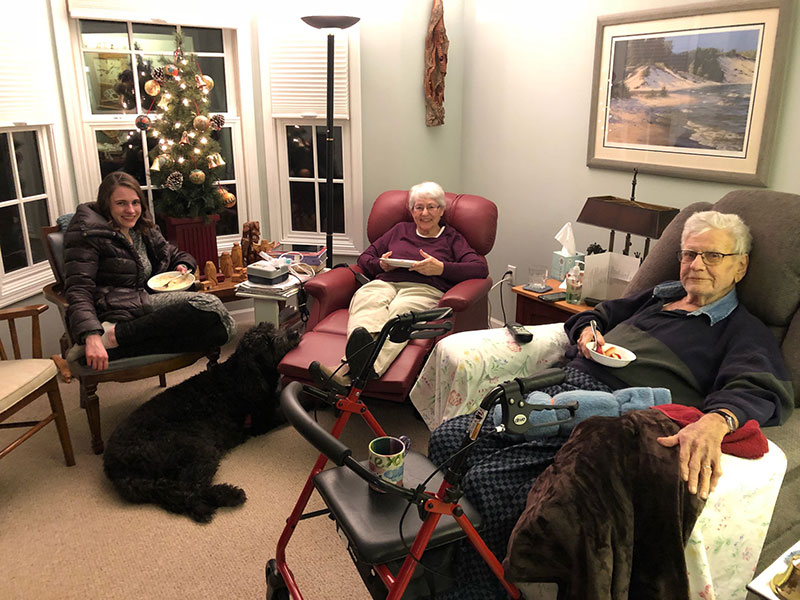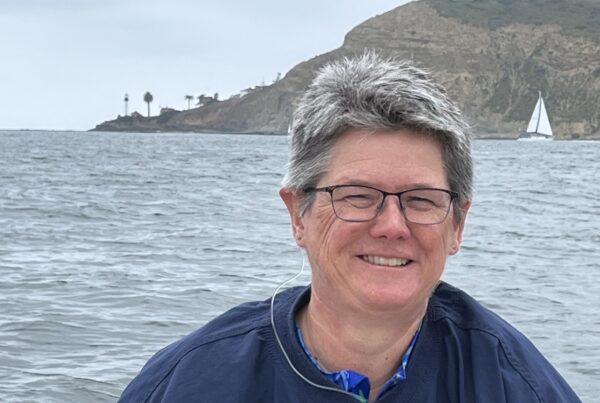In one of the last conversations I had with my grandpa, I asked him what was most important to him about his life. A lot of people might struggle to answer such a weighty question. But Grandpa didn’t hesitate. “Grace,” he told me.
He never stopped being amazed by God’s grace for him, and cognitively, I understood why. But the truth is, grace never felt as amazing to me as it should. If anything, it felt like a burden, a name I would always carry with me and never live up to.
God’s power made perfect in weakness
A few days after Grandpa died, I lost my phone. And because I’m on a family plan and not in charge of the account, my mom had to come with me to get a replacement. After I picked out a new iPhone, we got in my car for a quick conversation about a few funeral details. That “quick” conversation turned into two hours of crying and laughing and trying to figure out how a family of people who each care so deeply and so differently go about remembering a person well.
Mom had been thinking a lot about which Bible verses captured who Grandpa was, and she kept coming back to 2 Corinthians 12:9: “But he said to me, ‘My grace is sufficient for you, for my power is made perfect in weakness.’ Therefore I will boast all the more gladly about my weaknesses, so that Christ’s power may rest on me.”
When she read that verse to me, I finally got why Grandpa was so amazed by grace.
Before grace was my grandpa’s strength, it was his weakness. Grandpa’s heart beat for justice. He was filled with a righteous anger at how unfair the world could be. This made him a great advocate for people who were oppressed. But grace—grace asked Grandpa to replace his anger with love for the very people who were responsible for the injustices that made him so upset.
In his weakness, he found his greatest strength.
This was never easy for him. Yet he knew how precious the gift of grace could be, and he wanted to share it with the people around him. So he learned to rely on God’s strength instead of his own, and in his weakness, he found his greatest strength.

On the day I asked my grandpa about what he considered important about his life, I had made a bunch of spaghetti sauce, so I brought some over for dinner that night.
Grace isn’t optional
Grandpa’s strength was that he loved people. And he lived his life in community with them. He brought over his famous homemade potato-leek soup when they were sick, invited them to dinner when they were new in town, and offered counsel when they were struggling.
To me, loving people like my grandpa did is the essence of grace. People are broken. There’s only one person in the history of the world we can possibly love well without extending any grace: Jesus. It is literally not possible to love a human being without also giving them grace. Which explains why loving other human beings is so stupidly hard. But if anybody should be trying to do it, it’s the church! So why aren’t we proclaiming this message of grace-filled love with our lives and our voices to anyone who will listen?
I’m not interested in a church that is so busy arguing about the prenuptial conditions for membership that it never gets around to inviting anyone to join.
Most of us try to extend grace-filled love to our families. But too often, we stop there. We call each other “brothers and sisters in Christ,” yet we don’t treat each other like we mean it. My grandpa didn’t love perfectly. It was only with God’s help that he even loved well. But I think he did try really hard to love everyone like family.
Grace needs to be enough for us
I’m not saying everyone in the church needs to start cooking potato-leek soup for people. And I don’t want to be my Grandpa, either. As an introvert, I would lose my mind if I tried to maintain his social calendar. While I love the idea of communal living in theory, in practice, I consider having no plans on Friday night to be cause for celebration. So I won’t show love to people in all the same ways as Grandpa did.
But I do want to love people with the same kind of grace as my grandpa. And I desperately want to be part of a global church that has the grace to truly love people in all our imperfect, messy brokenness.
Our world is hurting. We are hurting. And we know Jesus can heal it. So I’m not interested in a church that is so busy arguing about the prenuptial conditions for membership that it never gets around to inviting anyone to join. Grace was enough for my grandpa. Grace is enough for me. And grace needs to be enough for the church, too.
Grace Ruiter co-founded Faithward and oversaw its growth from a small blog to a ministry that reaches 100,000-200,000+ people each month. She has been asking too many questions ever since she started talking, and she has no plans of stopping now. Although her curiosity has challenged her faith at times, it's also how her relationship with God has grown to where it is today. You can get in touch with Grace at graceruiterwrites@gmail.com.




